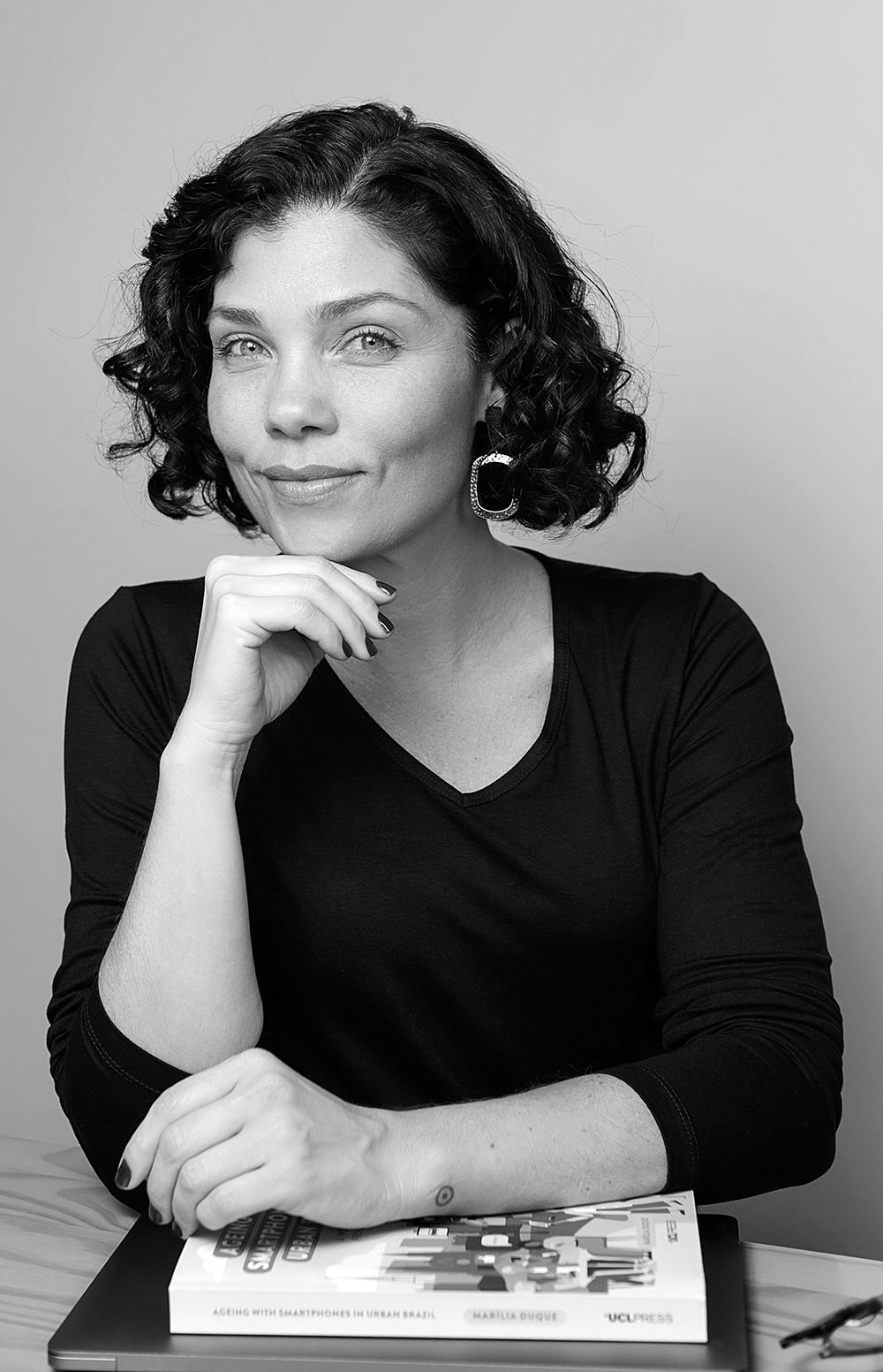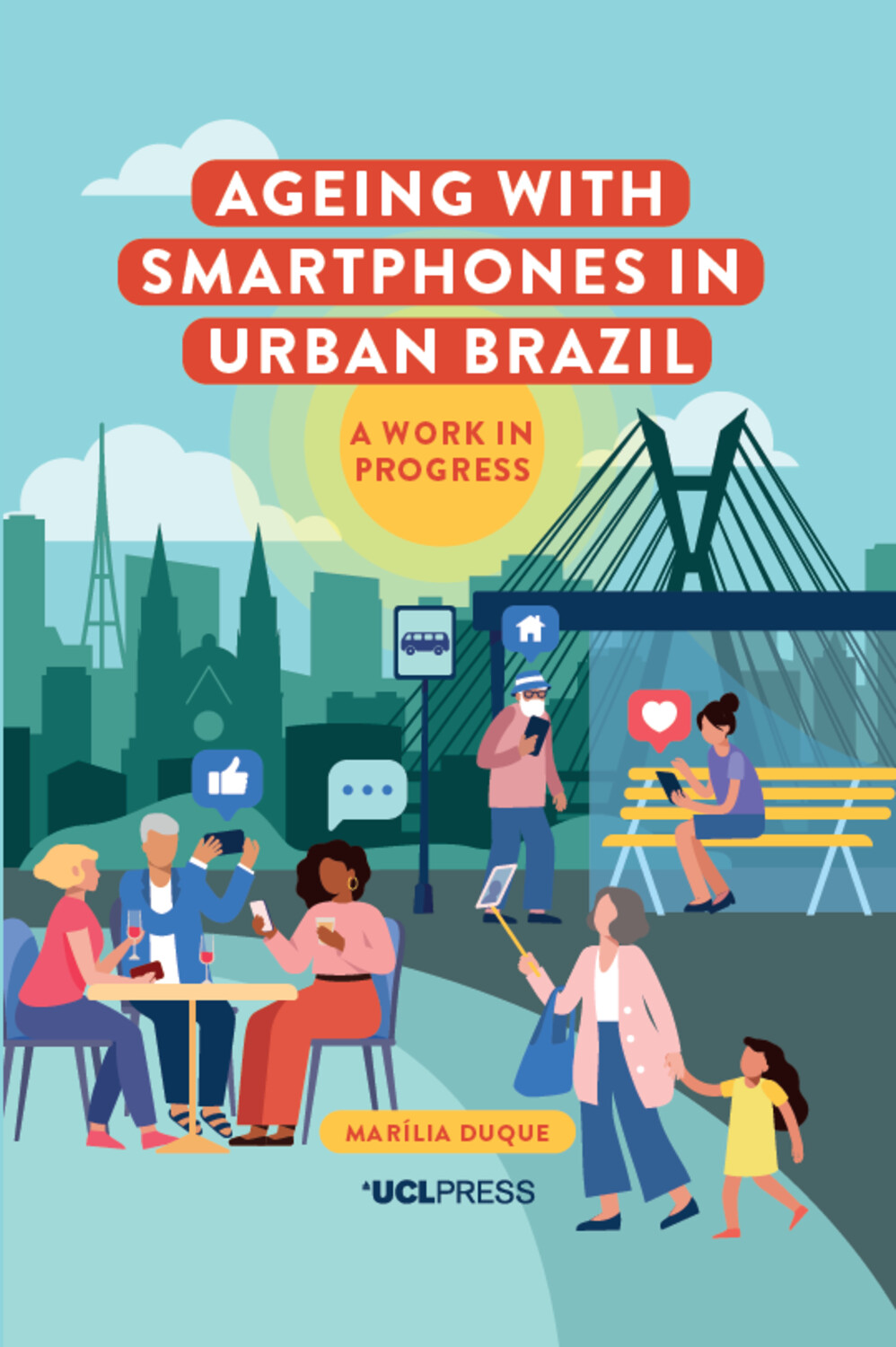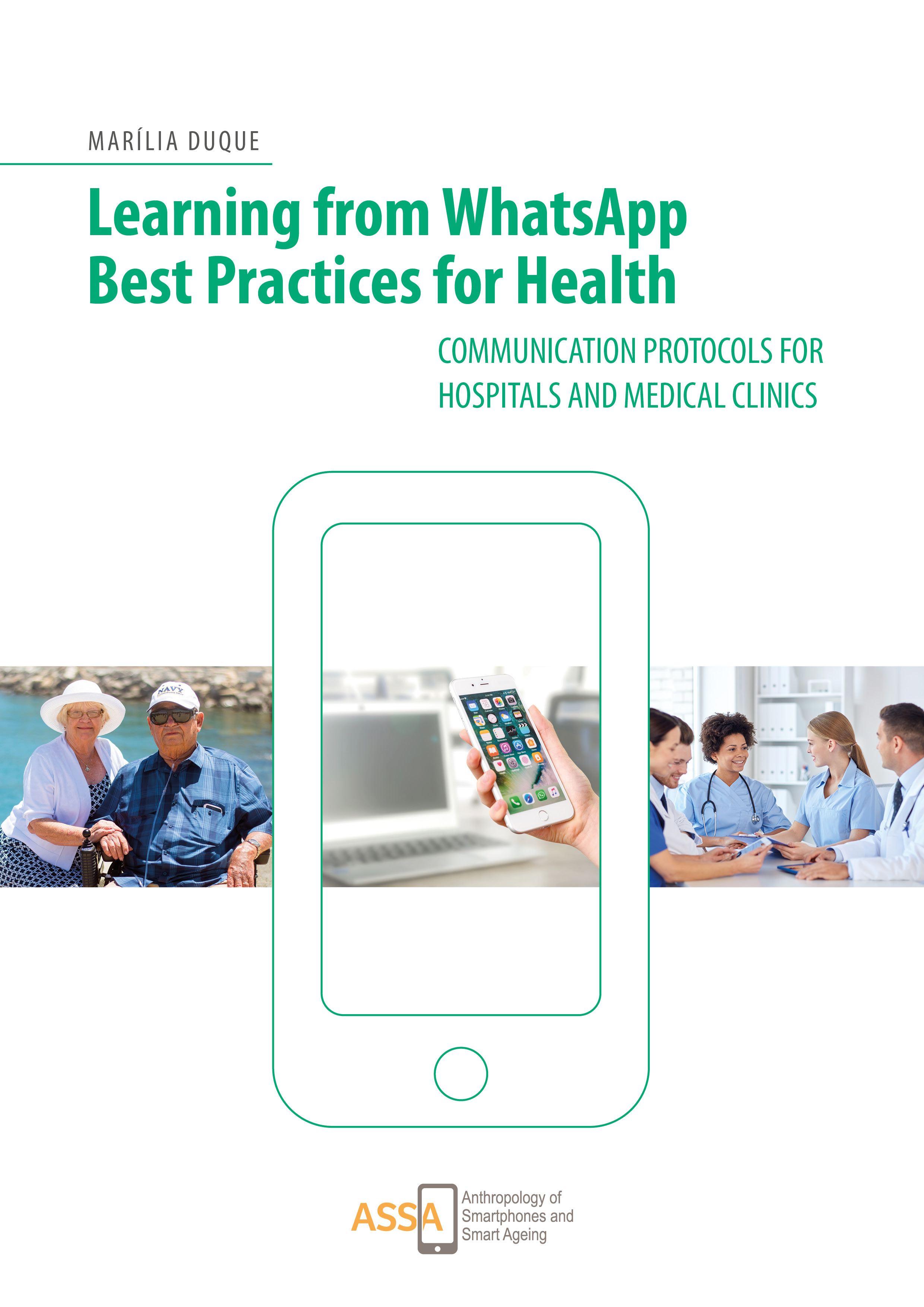
I completed my BA in Social Communication at the University of São Paulo (USP). After working in the advertising industry for almost two decades, I returned to academia and completed my MA and PhD in Communication and Consumption Behavior at ESPM São Paulo.
During my PhD, I joined the ASSA team as a research associate. Based at the University College London and funded by ERC, the ASSA project aimed to provide a comparative anthropological perspective of the impacts of smartphones on ageing and health. That was also the topic of my doctoral research developed within the Communication field.
I conducted a 16-month ethnography with older adults in São Paulo that supported both my thesis “Homo resiliens” and the book “Ageing with Smartphones in Urban Brazil: a work in Progress”, published by UCL Press.
As part of ASSA’s applied outcomes, I also developed two protocols for health based on my observation of the everyday uses of WhatsApp for medical purposes: “Best Practices of WhatsApp for Health” and “WhatsApp for Nutritionists”.
My current research meets two global trends: ageing and digitalization. I investigate the impacts of the digital divide (access, skills and outcomes) on active and healthy ageing. I focus on the cumulative disadvantages (regarding health, work and citizenship) older people might face due to their lack of digital literacy.
I am recently a research associate at LiteraCity, where I combine strategic thinking with my academic background and ethnographic skills to design and validate digital solutions aligned with older people’s needs.
I work as a consultant for industry, government and the third sector, and I give mentorship for AgeTechs. I am also committed to communicating science to the broader community by giving talks and lectures.
Research Experience
LiteraCity Lab
Research Associate (2022 – present)
Conducting research on digital literacies’ impacts on consumers and citizens – focused on older adults in Brazil.
Ladige: Digital Laboratory for Food Education and Humanities / Federal University of Rio de Janeiro
Research Associate, CNPq (2022 – present)
Conducting research on mediatization of food education in contemporary culture.
MediaLab ESPM São Paulo
Research Associate (2019 – 2021)
Investigating the advantages and disadvantages of using WhatsApp for health.
GPECC Ethics, Communication and Consumption Research Group, CNpQ
Research Associate (2014 – 2022)
Research Project ‘Digital Privacy and Ethical Implication’, funded by the Brazilian National Council for Scientific and Technological Development (CNPq).
Observatory of Ethics
Research Associate / Co-editor (2014 – 2020)
A collective blog dedicated to discussing ethics and moralities in everyday life, focusing on privacy and technology.
Department of Anthropology, University College London
Research Assistant (Ago 2019 – Jul 2020) / (Mar2021 – Jun 2021)
Project “ASSA – Anthropology of Smartphones, Smart Ageing and m-Health”: a comparative study on the impacts of smartphones for ageing and health. Ethnography conducted in São Paulo, Brazil. Supervised by Prof. Daniel Miller; funded by the European Research Council (ERC) under the European Union’s Horizon 2020 research and innovation programme (grant agreement no. 740472).
PDSE, CAPES
Visiting Doctoral Researcher (Jul 2019 – Mar 2020)
University College London/Anthropology under the supervision of Prof. Daniel Miller.
Peer-reviewed Journals Available in English
The Accidental “Age-Friendly City”: Public Expectation and Subjective Experience in São Paulo.
Lusophone Journal of Cultural Studies, 2022.
Two optimisation projects, globally promoted, aim to respond to the challenges of con-temporary urban life. The first one is Smart Cities, structured from a technological and informa-tional apparatus that aims to make the city more efficient. The second one is Age-Friendly Cities, conceived to adapt urban environments to enable active ageing. Both projects are shaped in the neoliberal system as emancipatory proposals to empower citizens for participatory citizenship in the city. This article proposes that smart cities demand new skills for active ageing, causing challenges for age-friendly cities regarding digital inclusion and digital literacy. Bringing this dis-cussion into the Brazilian context, we propose that for the elderly, none of these projects is wholly carried out. However, from an ethnographic perspective, we have mapped how a group of older adults in São Paulo builds their own informational network (centred on WhatsApp), enabling participatory and belonging instances from a perspective that comes “from below”. From this mismatch between urban projects and experience, we point to the emergence of an accidental city that is informally smart and age-friendly.
CITE: Duque, M., & Oliveira, A. L. de. (2022).The Accidental “Age-Friendly City”: Public Expectation and Subjective Experience in São Paulo. Lusophone Journal of Cultural Studies, Vol. 9, No. 1, 2022, pp. 67–86. https://doi.org/10.21814/rlec.3649
Can Older People Stop Sharing? An Ethnographic Study on Fake News and Active Aging in Brazil.
Online Media and Global Communication, 2022
An association between age and misinformation is frequently found in literature, which contributes to a moral panic about older people’s participation in the dissemination of fake news. This qualitative study adds context to this discussion by investigating why older people are motivated to engage with online information and why sharing matters in old age.
CITE: DUQUE, M.; PERES-NETO, L. Can older people stop sharing? An ethnographic study on fake news and active aging in Brazil. Online Media and Global Communication, v. 1, n. 3, p. 580–599, 27 set. 2022. https://doi.org/10.1515/omgc-2022-0034
Performing healthy ageing through images: From broadcasting to silence.
Global Media And China, 2021
This article addresses the centrality of images in the definition of a new paradigm for ageing, when health (measured by autonomy) becomes a condition for freedom (associated with youth). Based on a 16-month ethnography conducted with older people (aged 50–80) in a middle-class district in São Paulo, Brazil, I found that smartphones empower older people to craft a health identity by engaging and producing content that highlights the positive aspects of ageing. In this community, health is a concept deeply associated with productivity, and social media becomes a space for participants to present themselves as busy, giving visibility to all of the activities they engage with.
On WhatsApp groups, participants can also work as curators, sharing content that is in the public interest, which improves their collective experience of ageing and restores their sense of utility and dignity. I found that smartphones also allow participants to manipulate the mechanism of social comparison used to classify who is healthy and who is old. Often, when they have a condition or frailty, they confine themselves to online interactions, hiding from view the ageing body that could compromise their performance. By doing that, their declines are kept on the backstage of their social interactions, allowing participants to extend their presence within the third age, which is associated with freedom and autonomy, while the decline related to the fourth age is kept in the shadows.
CITE: Duque M. Performing healthy ageing through images: From broadcasting to silence. Global Media and China. 2021;6(3):303-324. doi:10.1177/2059436420975221
Conferences Abroad
Panel Convenor: The Human Factor: smartphones and the informal forms of communication and care in medical environments. EASA, Lisbon, 2020. https://nomadit.co.uk/conference/easa2020/p/8440
Presenter: “Can I add you on WhatsApp?”: providing an always-on channel for communication and its impacts for health and care practices in Sao Paulo, Brazil. EASA, Lisbon, 2020.
Presenter: An ethnographic contribution to mHealth. ASA, Norwich, 2019. Co-author with Charlotte Hawkins.https://nomadit.co.uk/conference/asa19/paper/51176
Presenter WIP: “Shut up and like it: the spiral of silence on Facebook”, Social Media Society, London, UK, 2016.
Presenter: “Ethos Typology on Facebook”, Social Media Society, Toronto, Canada, 2015.
Guest Lectures, Presentations & Invited Talks
‘Communication, Consumption and Cancel Culture’
ESPM São Paulo. Mar23.
‘Dr. Google and Health Information: impacts of media literacy on digital health literacy for older people’
Guest lecture at the Specialization Course in Geriatrics of the Sírio-Libanês Hospital Teaching and Research Institute – IEP/HSL. Feb23.
‘Beyond WhatsApp Walls’
Invited speaker at the Longevity technology forum: beyond the walls of connection. Research and Training Center SESC SP. Oct22.
‘Uso de Tecnología por Personas Mayores: oportunidades y desafios’
Guest lecture at Programa Adulto Mayor, belonging to the Ageing Studies Center of the Pontificia Universidad Católica de Chile. Oct22.
‘Digital world: opportunities and barriers for older people’s participation’
Keynote speaker at Municipal Pre-Congress of Active Ageing. Sep22.
‘Ageing in the Digital Age’
Keynote speaker at VI Municipal Congress of Active Ageing. Sep22 .
‘The impacts of SeniorTechs for older people’
Guest lecture at the Specialization Course in Geriatrics of the Sírio-Libanês Hospital Teaching and Research Institute – IEP/HSL. Jul22.
‘Health visibility, food consumption and opportunities to keep a visual food diary in old age’.
Coffee, Science and Talk. Online delivered to Nutrition Institute of the Rio de Janeiro State University. Oct21.
‘Communication strategies applied to Nutrition’
Online delivered to LADIGE Digital Lab of Education in Nutrition and Humanities (UFRJ). Jul21.
‘New methods for health promotion during social isolation’
Online delivered to Federal University of Rio de Janeiro (Knowledge Festival). Jul21.
‘The Global Smartphone: impacts for communication, sociability, kinship, citizenship, health and ageing’
(with Prof. Daniel Miller and Prof. Alfonso Otaegui).
Online delivered to Media Lab ESPM São Paulo. May21.



